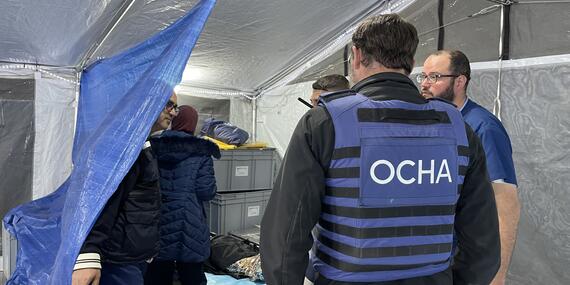Today's top news: Occupied Palestinian Territory, Lebanon, Sudan, Haiti

Occupied Palestinian Territory
Intense Israeli bombardment and ground operations, as well as heavy fighting between Israeli forces and Palestinian armed groups, continue to be reported across much of the Gaza Strip, resulting in further civilian casualties, displacement, and destruction of homes and other civilian infrastructure.
Yesterday, a 13-year-old girl who had been trapped for 40 hours under the rubble of her destroyed home in Hamad city in Khan Younis governorate, was rescued and transferred to a field hospital in Rafah. Her entire family was killed. The Palestine Red Crescent Society and OCHA took part in her evacuation.
The ongoing violence continues to hamper safe and efficient humanitarian operations. The UN and our partners need security assurances and unimpeded passage to distribute aid, at scale, across Gaza.
Lebanon
OCHA is deeply concerned about the continuing hostilities severely affecting civilians and civilian infrastructures along the Lebanon-Israel border and beyond.
This includes an Israeli airstrike on a health center in Odaisseh, in the south of Lebanon, on 4 March. Three volunteer paramedics were killed. The World Health Organization (WHO) condemned this incident, urging an immediate halt to attacks on civilians and health care in Lebanon.
WHO reported that, since 7 October, seven attacks on health care facilitates in Lebanon have been reported, resulting in seven deaths.
The humanitarian situation in the south of the country remains dire, with more than 90,000 people internally displaced and at least 42 civilian casualties reported as a result of the fighting.
Sudan
The Under-Secretary-General for Humanitarian Affairs, Martin Griffiths, said it is critical to ensure cross-border aid to the country.
In a social media post, he welcomed the Government’s decision to allow aid in through several border crossings and to allow for more humanitarian flights.
Mr. Griffiths underscored that communities caught behind conflict lines need more – saying time is of the essence.
Meanwhile, the World Food Programme (WFP) is warning that the country’s war could trigger the world’s largest hunger crisis.
In a statement issued today, WFP said more than 25 million people across Sudan – as well as in South Sudan and Chad, which is hosting people who have fled the fighting – are trapped in a spiral of deteriorating food security.
WFP’s Executive Director Cindy McCain is currently visiting transit camps in South Sudan, where almost 600,000 people have crossed from Sudan in the past 10 months.
Haiti
Thousands of civilians continue to be caught up by the recent violence in Haiti's capital, Port-au-Prince.
The majority of the 15,000 newly displaced are women and children.
Displaced families are traumatized. Access to food, healthcare, water and hygiene facilities, and psychological support are among the most urgent needs.
We and our humanitarian partners are mobilized and have been delivering emergency aid, but the escalating violence is severely disrupting operations.
Humanitarian colleagues on the ground are concerned about the impact of the violence on hospitals, health centres and schools in Port-au-Prince and some other neighbouring towns.
Health infrastructure is on the brink of collapse. Port-au-Prince’s main public hospital has closed due to violence and the inability of staff to reach the premises. The main hospitals receiving wounded civilians are overloaded, in part due to the number of wounded civilians injured. There is an urgent need for blood products in the country. In a positive development, Médecins Sans Frontières announced yesterday that they managed to open another health centre in Carrefour.
Humanitarian organizations need unhindered access to the most vulnerable people.
